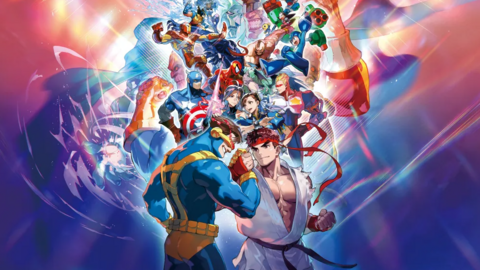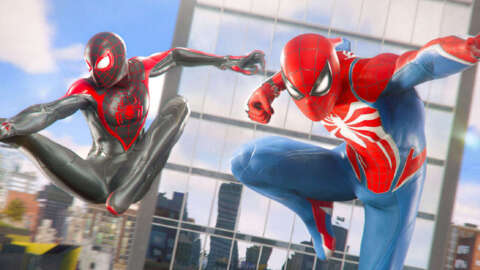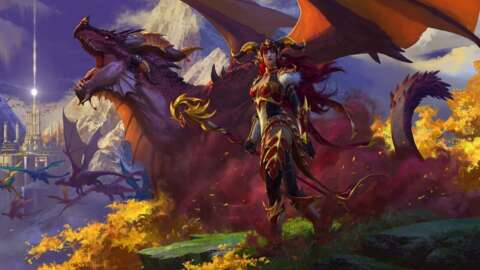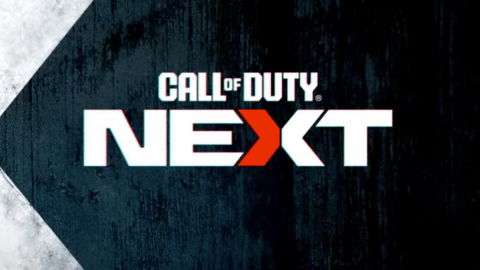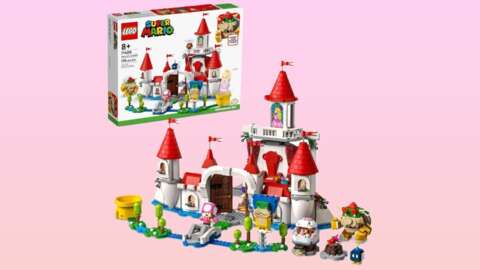We are currently enjoying a golden age of fighting games. The latest in long-running series like Street Fighter, Tekken, and Guilty Gear are fantastic. Both newer (Dragon Ball FighterZ) and older games (Street Fighter 3rd Strike, Guilty Gear +R) are getting updates that add rollback netcode, enabling fans to enjoy the best player-to-player connections possible. And many new games are also being ported to nearly every platform, so it’s easier than ever to play what you want, with who you want, when you want.
Some games have long been neglected and rendered unplayable on modern hardware, causing members of the fighting game community to call for developers to re-release or update them to be more accessible. Streamer Maximilian Dood’s #FreeMVC2 movement is perhaps the most notable of these and, thankfully, this particular situation is about to be rectified. Marvel Vs. Capcom 2: New Age Of Heroes is coming back, ensuring the granddaddy of tag fighters will find a place in the hearts of brand-new fighting game players, not just the old heads.
The game is being released as part of the Marvel Vs. Capcom Fighting Collection: Arcade Classics, which also includes X-Men: Children of the Atom, Marvel Super Heroes, X-Men Vs. Street Fighter, Marvel Super Heroes Vs. Street Fighter, Marvel Vs. Capcom: Clash of Super Heroes, and The Punisher.
I dabbled in MvC3 and have played thousands of hours of Dragon Ball FighterZ, a spiritual successor to MvC, but growing up, none of my local arcades (or friends’ houses) had Marvel Vs. Capcom, so my access was limited. I was curious to see how these older games held up for someone like me, who has little nostalgia for them, but my fears were laid to rest when I started playing through each one. I spoke to MvC Fighting Collection: Arcade Classics producer Shuhei Matsumoto after playing, and he confirmed that newer players like me are a key part of the collection’s target audience.
The preview build I played at Evo granted access to three games from the collection; X-Men: Children of the Atom, X-Men Vs. Street Fighter, and Marvel Vs. Capcom 2. So how do these games from 1994 to 2000 hold up? Quite well it seems. These games don’t have the level of polish when it comes to balance in comparison to newer games, where players can expect most of the roster to be competitively viable and roughly equivalent in power, but the MvC games themselves have character and style in spades, and are still incredibly fun to play. And that sense of wildly unbalanced gameplay is part of its charm.
All the games in the collection are faithful recreations of the original arcade games.
Fluid and responsive controls match the gorgeous sprite-based graphics in MvC2, and it’s fast and easy to jump from one part of the collection to another. Games like X-Men: Children of the Atom and X-Men Vs. Street Fighter are slightly less chaotic, but attacks are still chunky and fun and movement is pretty dynamic. Characters are diverse in how they play, which is appropriate given the varied powers of the X-Men characters, and the fighting styles of the Street Fighter roster.
I played Iceman in Children of the Atom, and it was a blast calling down massive boulders of ice on opponents. Cyclops can shoot his optic blasts across the screen, and Storm can summon small whirlwinds and lightning, keeping enemies on their toes. Street Fighter characters generally play similarly to their Street Fighter 3 versions, with some notable differences. Ken’s grounded fireball doesn’t go fullscreen in every game, but much like Akuma in the mainline games, X:Men Vs. Street Fighter’s Ken and Ryu can throw fireballs in the air, with Ryu’s going straight ahead, and Ken’s moving downwards at an angle.
For newer players, I recommend starting with X-Men Vs. Street Fighter, and Matsumoto-san recommends jumping into the similar Marvel Super Heroes Vs. Street Fighter, or MvC2. Marvel Vs. Street Fighter is more focused, with a smaller roster and fewer things to think about, so players who have never tried any fighting games but the 1v1 ones (Street Fighter, Tekken, most Mortal Kombat games, etc.) would likely do better starting there.
You can’t go wrong with Spider-Man.
Although the collection is releasing this year, Matsumoto-san said the team has been working with Marvel for three or four years to figure out when a collection like this could be released for modern platforms to bring it to new audiences. As the collection’s title suggests, each game is a port of its arcade version. Matsumoto-san said the team thought very carefully about which versions to include, focusing on ones that were the most beloved by fans. I’m also pleased to say that, instead of being a simple port, this collection is robust and the team has included quite a few quality of life improvements.
Each game has a special menu you can access before you launch, for example, letting you adjust settings on everything from arcade screen scan lines to aspect ratios, and use or hide different sidebar art. Accessibility options have been added, too, including single player difficulties, flashing light reduction, the ability to change which coin mode you use, secret character and hidden color toggles. One-button supers are also available for people who want to jump in and start beating up their friends without learning standard inputs, or lack the physical dexterity to do so. Quick save and quick load functions also mean you can stop playing and pick back up where you left off.
A training mode is also available, and while it isn’t as robust as the one in Street Fighter 6 (a high bar to clear, to be sure), it does have startup information for moves, hitboxes, hurtboxes, and input readouts, making it much easier to get started and work out new combos and situations. You can also go into training mode with two players, which is nice.
Years later, it’s still funny seeing Hulk get tossed around like a rag doll.
Some other changes have been made to better align the content of the game with modern day standards. Matsumoto-san said the team modified certain parts of the game which would impact the rating, such as altering “expressions or content that may not be appropriate for modern times.” But game balance and gameplay elements are “faithfully reproduced for modern platforms.”
Much like other Capcom collections, (such as the Mega Man Legacy Collection) Matsumoto-san confirmed the Marvel Vs. Capcom Collection includes “a gallery where you can check out some of the design documentation from when those original games were being made, past promotional illustrations and music.” A music player will allow players to listen to the soundtrack of each of the games, and legacy art and assets are included, too.
I wasn’t able to try out the online play, so I can’t say how the netcode will stand up yet, but if Capcom’s previous work on Street Fighter 6 is any indication, we’re in for a buttery smooth online experience.
So many of the mechanics and features that are popular in tag-team fighters today were popularized in MvC games.
So what does this collection mean for the future of Marvel Vs. Capcom? Well, if the collection sells well, we may see another new Marvel Vs. Capcom game. I asked Matsumoto-san what he would do with that opportunity, whether he had an idea for what new characters he would want to include, and which gameplay elements they would add or subtract from previous entries. He said, “The hardest thing to decide on would definitely be the character choice, because you look at Marvel’s roster now and there’s a lot more characters now than there were back 20, 30 years ago. My impression of these MvC-type games is that it’s almost like… ‘have fun, [be] cheerful, almost like a party,’ with all these different characters and personalities and I think that aspect is something that’s important to the series, and should be maintained.”
“It also has to be fun for kids,” he continued. “Kids gravitate towards their favorite superheroes, and they want to play with those superheroes. So given that opportunity, it’s important to the series.” This was certainly true for me. The first character I put on my MvC2 team was Spider-Man, my second favorite superhero ever. Coincidentally, the shirt I wore to the interview bore the symbol of my #1 superhero, Superman. Matsumoto-san laughed about it when I told him, saying “We probably wouldn’t be able to include him,” before going on to joke, “Guest character!” While we may never get Marvel Vs. Capcom Vs. DC (or Marvel Vs. Capcom Vs. DC Vs. Dragon Ball, as we joked about afterwards), the future’s looking bright for this crossover fighting game series.
Player love for Marvel Vs/ Capcom has been strong for a long time, and lines were long to play the collection on the Evo show floor, showing the enthusiasm is still there. From my preview time, that love is shared by Capcom, which is putting a good foot forward with this (so far) high quality collection. With that in mind, I asked Matsumoto-san what he thought about the current state of fighting games, particularly considering newer games–like 2XKO and Dragon Ball FighterZ–clearly draw some inspiration from what Capcom had previously done with MvC. When I told him I felt we are in a new golden age, he said, “I definitely agree with your own impression” and that, with HunterXHunter and 2XKO, he hopes to see more people become interested in fighting games.
As far as I’m concerned, Matsumoto and the team at Capcom are doing their part by putting out this collection. I’m looking forward to playing more (and trying to convince all my friends to join me online) when it comes out later this year.
